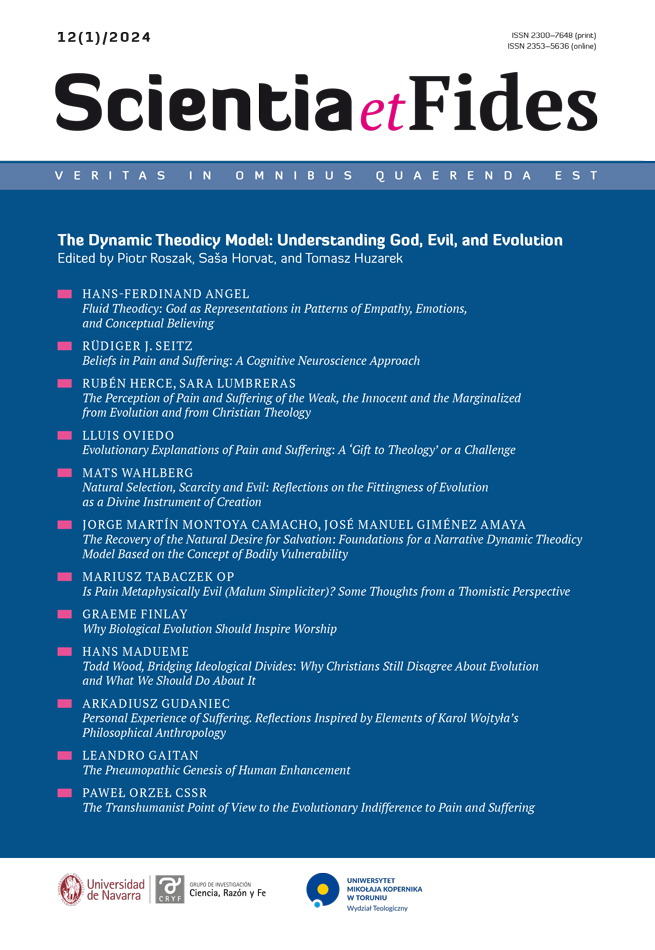Evolutionary Explanations of Pain and Suffering:
A ‘Gift to Theology’ or a Challenge
DOI:
https://doi.org/10.12775/SetF.2024.005Keywords
health, grace, salvation, cultural, evolution, altruismAbstract
Evolutionary studies have provided several explanations about how pain and suffering can be fitted into that framework, which tries to make sense of every biological and human feature in terms of evolution, survival, and fitness. These explanations point usually to how such apparently negative aspects become useful and contribute to an evolution that after all has delivered good outcomes. Such an approach might eventually render the theodicy question less sharp and critical for believers who are trying to cope with the scandal of so great suffering in our world and history. Theologically we can welcome such new insights, less noticed in former tradition, but at the same time we need to be cautious before a development which could render less clear the message of Christian salvation. In any case, the new data and knowledge clearly invite to revise and reformulate the Christian salvific message, to better answer before the mystery of evil and suffering.
References
Ayala, Francisco J. 2007. Darwin’s Gift to Science and Religion. Washington: Joseph Henry Press.
Bassett Rodney L., Sarah Scott, Melissa Emerson et al. 2020. “May Grace Abound: Making God’s Grace Cognitively Salient May Increase Reparative Action.” Journal of Psychology and Theology 48(3): 218–28. https://doi.org/10.1177/0091647119890100.
Boyd, Robert and Peter J. Richerson. 2011. “The cultural niche: Why social learning is essential for human adaptation.” Proceedings of the National Academy of Sciences, 108: 10918–25.
Bregman, Rutger. 2020. Humankind: A Hopeful History. London: Bloomsbury Publishing.
Christakis, Nicholas. 2020. Blueprint: The Evolutionary Origins of Good Society. Boston: Little Brown.
Dańczak, Andrzej. 2020. “The Difficult Ambiguity of the World: Suffering in the Context of Evolutionary Theology.” In Making Sense of Suffering: Theory, Practice, Representation, edited by Bev Hogue and Anna Sugiyama, 19–30. Leiden: BRILL.
Edwards, Denis. 2019. Deep Incarnation: God’s Redemptive Suffering with Creatures, Maryknoll, NY: Orbis.
Emmons, Robert A., Peter C. Hill, Justin L. Barrett, and Kelly M. Kapic. 2017. “Psychological and theological reflections on grace and its relevance for science and practice.” Psychology of Religion and Spirituality 9(3): 276–84. https://doi.org/10.1037/rel0000136.
Fehr, Ernst and Urs Fischbacher. 2003. “The nature of human altruism.” Nature 425: 785–91. https://doi.org/10.1038/nature02043.
Finnegan Diarmid A., David H. Glass, Mikael Leidenhag, David N. Livingstone, eds. 2013. Conjunctive Explanations in Science and Religion. London–New York: Routledge.
Gregersen, Neil H. 2001. “The Cross of Christ in an Evolutionary World.” Dialog: A Journal of Theology 40(3): 192–207.
Judd, Daniel K., W. Justin Dyer, W. J., & Justin B. Top. 2020. “Grace, legalism, and mental health: Examining direct and mediating relationships.” Psychology of Religion and Spirituality 12(1): 26–35.
Kruijthoff, Dirk, Elena Bendien, Kees van der Kooi, Gerrit Glas, and Tineke Abma. 2022. “Prayer and Healing: A Study of 83 Healing Reports in the Netherlands.” Religions 13, 11: 1056. https://doi.org/10.3390/rel13111056.
Laland, Kevin. 2017. Darwin`s Unfinished Symphony: How Culture Made the Human Mind. Princeton & Oxford: Princeton University Press.
Metz, Johann Baptist. 1977. Glaube in Geschichte und Gesellschaft. Studien zu einer praktischen Fundamentaltheologie. Mainz: Matthias-Grunewald-Verlag.
Oviedo, Lluis. 2016. “Religious attitudes and prosocial behavior: A systematic review of published research.” Religion, Brain & Behavior 6: 169–184. https://doi.org/10.1080/ 2153599X.2014.992803.
Oviedo, Lluis. 2022. “Original Sin: The New Scientific Context as Challenge and Opportunity.” Theology and Science 20–1: 99–118. https://doi.org/10.1080/14746700.2021.2012926.
Pinker, Steven. 2011. The Better Angels of Our Nature: Why Violence Has Declined. New York: Viking.
Sollereder, Bethany. 2016. “Evolution, Suffering, and the Creative Love of God.” Perspectives on Science and Christian Faith 68(2): 99–109.
Southgate, Christopher. 2008. The Groaning of Creation: God, Evolution, and the Problem of Evil. Louisville KY, & London: Westminster John Knox Press.
Staub, Ervin and Johanna Vollhardt, J. 2008. “Altruism born of suffering: The roots of caring and helping after victimization and other trauma.” American Journal of Orthopsychiatry 78(3): 267–80. https://doi.org/10.1037/a0014223.
Tomasello, Michael. 2016. A Natural History of Human Morality. Cambridge, MA & London, UK: Harvard University Press.
Wrangham, Richard. 2020. The Goodness Paradox. How Evolution Made Us Both More and Less Violent. London: Profile Books.
Wu, Taoyu and Shihui Han. 2021. “Neural mechanisms of modulations of empathy and altruism by beliefs of others’ pain.” eLife 10: e66043. https://doi.org/10.7554/eLife.66043.
Downloads
Published
How to Cite
Issue
Section
License
Copyright (c) 2024 Lluis Oviedo Oviedo

This work is licensed under a Creative Commons Attribution-NoDerivatives 4.0 International License.
CC BY ND 4.0. The Creator/Contributor is the Licensor, who grants the Licensee a non-exclusive license to use the Work on the fields indicated in the License Agreement.
- The Licensor grants the Licensee a non-exclusive license to use the Work/related rights item specified in § 1 within the following fields: a) recording of Work/related rights item; b) reproduction (multiplication) of Work/related rights item in print and digital technology (e-book, audiobook); c) placing the copies of the multiplied Work/related rights item on the market; d) entering the Work/related rights item to computer memory; e) distribution of the work in electronic version in the open access form on the basis of Creative Commons license (CC BY-ND 3.0) via the digital platform of the Nicolaus Copernicus University Press and file repository of the Nicolaus Copernicus University.
- Usage of the recorded Work by the Licensee within the above fields is not restricted by time, numbers or territory.
- The Licensor grants the license for the Work/related rights item to the Licensee free of charge and for an unspecified period of time.
FULL TEXT License Agreement
Stats
Number of views and downloads: 722
Number of citations: 0



